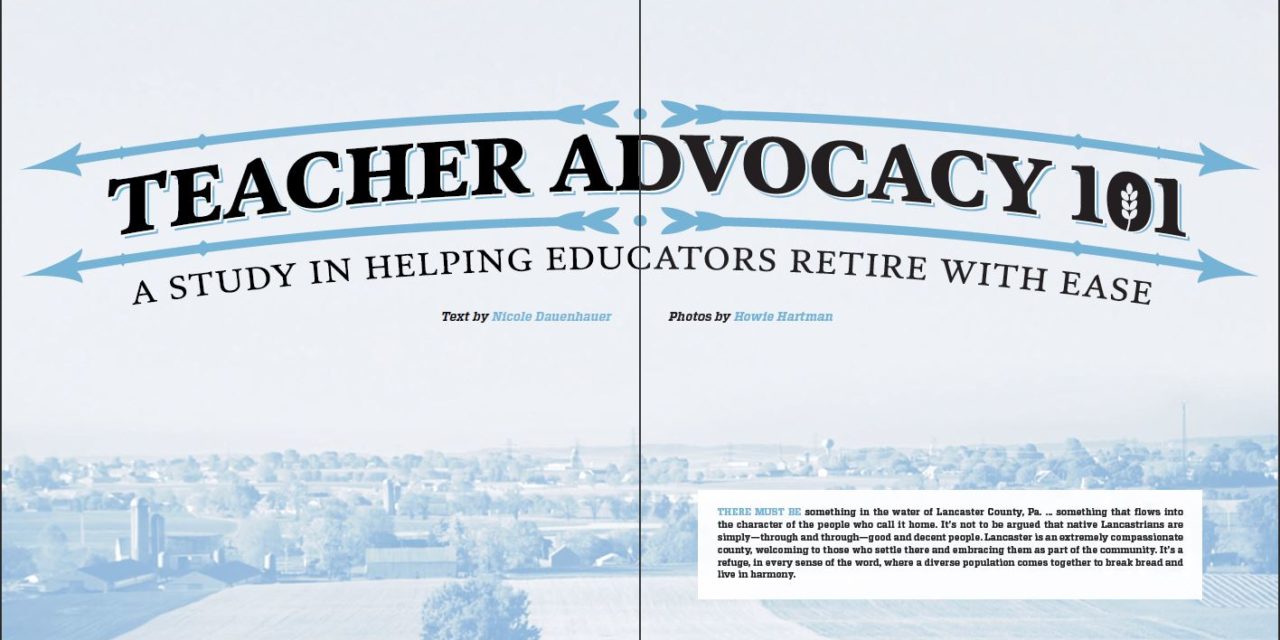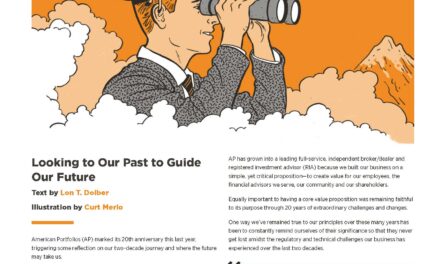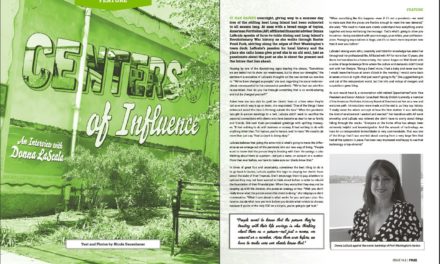
FREE 13.2 Feature: James Collier and Gregory Knisley
There’s a certain underlying moral code that Lancastrians have,” Collier relays. “I think we are both very much products of where we grew up, which makes us a good fit here. Unlike, say the big wirehouses, we have a finger on the pulse of the slightly more conservative—that’s conservative with a small ‘c’—mindset in Lancaster. We take in more refugees per capita than anywhere else in the United States.”
To view the full article please register below:
FREE 13.2 Feature: James Collier and Gregory Knisley
Teacher Advocacy 101, A Study in Helping Educators Retire with Ease
There must be something in the water of Lancaster County, Pa. … something that flows into the character of the people who call it home. It’s not to be argued that native Lancastrians are simply—through and through—good and decent people. Lancaster is an extremely compassionate county, welcoming to those who settle there and embracing them as part of the community. It’s a refuge, in every sense of the word, where a diverse population comes together to break bread and live in harmony.
That may sound idealistic to many people in this day and age, but then again maybe they haven’t had the pleasure of meeting American Portfolios (AP)-affiliated investment professionals James Collier Jr. and Gregory E. Knisely of Teacher Benefit Strategies, LLC (TBS). One conversation with them completely validates this preface. “There’s a certain underlying moral code that Lancastrians have,” Collier relays. “I think we are both very much products of where we grew up, which makes us a good fit here. Unlike, say the big wirehouses, we have a finger on the pulse of the slightly more conservative—that’s conservative with a small ‘c’—mindset in Lancaster. We take in more refugees per capita than anywhere else in the United States.”
In a similar way to how Lancaster became a refuge to the Plain community, inclusive of the Amish and Mennonites, that welcoming tradition holds fast to the county’s core. “I would say that there’s a compassionate conservatism [that exists here which] is unlike any other place in the country.” Knisely agrees, adding: “We’re both actually from Lancaster County, and our business is here— so this is, more or less, our hometown. We’re always going to have a foot in Lancaster.”
Collier and Knisely’s growing practice is very much tied to the Lancastrian ethos—having a deep-rooted commitment to helping Pennsylvanians who’ve dedicated their lives to shaping the minds of America’s future workforce by ensuring that they will have a worry-free retirement. The title on Collier’s business card reads “Teacher Advocate.” Succinctly put, that’s precisely what TBS’s mission is. “We hold ourselves out as a teacher advocacy firm,” Knisely summarizes. “Our goal is to focus on the retirement planning, financial planning and investment management for public school teachers in Pennsylvania as they’re approaching and entering into retirement.”
Pennsylvania teachers are among the most fortunate in the country, having robust pensions that provide them with a solid, guaranteed source of income. Their other sources of liquidity offer a longer time horizon because they don’t need to dip into any other qualified plans in which they, or their spouses, may have saved. While many broader-based financial planners may not regularly deal with teacher pensions, TBS’s niche-focused approach affords them the ability to hone in on the nuances of educator pensions to create a diversified retirement plan for each of the teachers that step through their office doors.
“Most of the clients that we meet, near or at retirement, don’t have any investment experience because most of their retirement planning had been done for them,” Collier explains. “We really start with some basics to build up a foundational knowledge of how their pension works and how nuanced it is. A teacher at retirement is about to make the two largest financial decisions in their entire life: how to receive their pension and, for people who are dependent upon their income all at once, how to go about survivorship planning. It can be pretty overwhelming. The benefit Greg and I have is that we’re seeing the same type of client over and over again, and we see a lot of commonalities in what their concerns and goals are.”
To this end, Collier and Knisely have created and copyrighted a client-facing guidebook entitled “The Retirement Timeline©”—a step-by-step tool that helps teachers easily navigate their last year of employment leading up to retirement. “We found that for many teachers, retirement was less of a financial concern and more of an emotional concern,” Knisely explains the motivation behind the guidebook created to help ensure a smooth transition into retirement. “It is a great visual [tool we can use] to say, ‘Hey, relax. Don’t worry. We have plenty of time. This is everything that you need, and the answers to the questions you’re asking are all in here.’” The Retirement Timeline also further legitimizes that TBS are not generalists, per se, but rather experts who specialize in helping teachers retire with ease. “It’s a framework that lends some peace of mind and security to know that there’s a process and they’re in good hands.”
That expertise stems from the fact that Collier began his career not as a financial professional, but as a school teacher. Having studied architecture and fine art during his undergraduate coursework, Collier went on to spend 14 years in the Pennsylvania education system as an art teacher. To his credit, many of Collier’s students were National Gold Key winners—recipients of The Scholastic Art & Writing Awards, America’s largest recognition program geared toward creative high school students. During his tenure, Collier also served for a time as the grievance chairperson for his school’s union. “This led me to my most enjoyable role in the union, which was a lead negotiator for our contracts in our school district,” Collier shares. “I negotiated for about 350 teachers in that bargaining unit. What I found was that, in addition to being a teacher, helping my peers through the union became more and more of a passion for me. A light bulb went off in that I was more focused on the work with my peers than the
work with my students, and that didn’t seem fair to me.” Once that realization kicked in, Collier’s career path veered into a new, though not unrelated, direction.
In 2007, the teacher once again became the student; Collier began to transition out of teaching at the age of 37 and headed back to school, aiming to complete his financial services education at breakneck speed. Undeterred, Collier took all three of his exams in roughly four months’ time. “That was probably the most stressful year of my life. I was 37 and I got the shingles,” he recalls of the toll it took on him. “I had a young family at that point; my kids were only about six and four, and my wife was—and is—also a teacher, so my income was extremely important to running my household.” In addition to his teaching and union work, he took on a part-time job during the summers, all while studying for the Series 7 and 66, as well as his health and life insurance license. Tenacity and drive aside, Collier chalks up his success in the financial services industry to the teachers who were willing to do business with him. “It was my colleagues from my school that really helped launch the career because they
put a lot of faith and trust in me at that point in time.” Displayed prominently on Collier’s office wall is his teaching certificate. “When a teacher sees that,” reflecting on the degree, “instead of them looking at me as an advisor, they see me as a peer and an advisor. And, I think that is a breakthrough; it just makes things easier from the get-go that I speak their language and I understand where they’re coming from.”
Knisely’s educational background, while different, is nonetheless storied. Like his partner, Knisely originally studied architecture, albeit from an engineering discipline. During his first year at Penn State University, he took a requirement course in economics, which set him on an entirely new path. While completing his bachelor’s degree in economics, Knisely briefly sojourned overseas at the Universidad de Grenada in Spain as part of his international studies minor. “When I came out of school and I had my degree in hand, I was working to get my skydiving license in North America. I had made plans to join the U.S. Air Force as a navigator and then use the GI Bill to get an MBA in Europe. I even had prominent business schools picked out in Spain and Italy. But, it was the Great Recession and they weren’t enlisting anybody.” Knisely then started to put his resume out; within a few short days a recruiter from AXA Advisors, LLC contacted him. In 2014, while working at AXA, Knisely was invited to attend a prestigious educational event hosted by the Harvard Faculty Club in Cambridge, Mass., to gain a better understanding of asset allocation, wealth advisory strategies, portfolio management and the development of effective client relationships. During the same timeframe, Knisely was also hard at work on earning his Certified Financial Planner (CFP) designation, which he looks at as the gold standard of financial services industry education. “For me to be able to operate in a market economy where I’m charging somebody a fee, and I’m giving them advice, I felt it was ethically incumbent upon me to be adding value. I wanted to become a CFP because, after doing some research, I felt that it was the right designation to go for,” Knisely recalls, thinking back on his motivational philosophy.
In part, it was Knisely’s ethical code that drew Collier, his then-AXA colleague, to him. “At that point in time, I was more or less acting almost as the only broker providing a 403(b) product to the network of teachers that I had grown to know. When I met Greg, the opportunity for us to form a partnership and basically elevate the type of service that I was giving to my clients presented itself.” Collier looks back on those early days of their professional relationship. “When Greg came to AXA, I think he was only 22 or 23, but he looked like he was 18; and, I’m a little older than Greg—I had a little bit of gray hair,” he laughs. “We identified from the very beginning what our strengths and weaknesses were. Greg is one of the most ethical and moral people that I’ve ever met, which leads him to ask many questions.”
Collier soon realized that Knisely was asking all the right questions for the right reasons—and came to the conclusion that he was the type of partner who could elevate his practice to a whole new level. “I wanted to be doing joint work with other people so that we add as much value as we can,” Knisely emphasizes. “Jim was the guy that I identified with at AXA; he was one of the smartest guys. And, with his background, he already had the experience and understanding of what retirement looks like for public school teachers.”
“When we started working together, we realized that, although we were bringing two very different things to the table, we shared one very common goal and that was to improve the financial lives of teachers,” Collier adds. “At the end of the day, I think the thing that makes our relationship so successful is the fact that we’re both focused on the betterment of teachers’ financial pictures. And again, applying that fiduciary standard to everything that we do, and not putting on the suitability hat and then putting back on the fiduciary hat. We both agreed from the very beginning that we wanted to wear the fiduciary hat for everything.”
Collier and Knisely soon realized that the pressure to use certain proprietary productswasn’t suited to the financial goals of their clients. Going independent seemed the logical direction to take. “I understand how the industry works, but our clients all have these super robust pensions. And, what is a pension but a ‘ginormous’ annuity. The last thing that they need to do is to lock that up in another annuity,” Knisely posits with the best interest of his clients in mind. “When we formally agreed to start TBS, we really wanted to build up a core constituency of clients so that we could go independent. As soon as we were approved to start this DBA, we hired our own attorney and accountant—and then ran this thing as an independent business from 2011 on.”
In 2015, TBS learned of American Portfolios through an introduction by AP-affiliated investment professional and OSJ Adrian Young, who had been a former colleague of theirs at AXA; from there, they began their transition to the independent broker/dealer. It was AP’s emphasis on independence and the freedom to operate their business on their own terms that drew them in. “We didn’t want to be affiliated with a broker/dealer who had a vested interest in trying to get us to do something, or move a product, or anything along those lines,” Knisely states. “The bottom line is that we want to have our clients’ best interests at all times in front of us,” adds Collier. “We want complete and open architecture, and we want to follow through with the promises we made to our clients.”
Now comfortably settled with AP, TBS is free to function without jeopardizing those promises made to their roster of loyal and satisfied clients. They do so through Collier’s broad expertise in educator pension plans and teaching experience, coupled with Knisely’s prowess for financial planning and in-house model management tailored to each client’s needs. “We gave up on the idea of pursuing active management and using index funds,” Knisely states. “We wanted to cut out the middle man and handle this personally in house, both to maximize profits and have greater control. What we’ve learned over the years is that when you really own it, and understand exactly how and why you made all these decisions, you have a lot more confidence that’s coming through in your conversations with the clients when they’re talking about their hopes and fears about growth and volatility. It’s always been important for us to be honest and open with people.”
TBS believes that their niche market came out of necessity as opposed to design. Doing so has accounted for their growth and success, with a steady stream of referrals coming in by word of mouth from existing clients and outreach to teachers’ unions. “One of the best things that has come out of finding a niche to work in is that we’ve really been able to add so much value to so many people; it’s more than just a simple, transactional relationship,” Knisely states. “There are a lot of truly wonderful people that have chosen to become school teachers and it has been very rewarding to work with a lot of good people who appreciate what you’re doing.” Adds Collier, “This is a service industry, and 90 percent of the revenue that we’re generating is reoccurring fees. We need to take care of the people who are paying us. We need to take care of the people that we gave that commitment to.”
What lies ahead for TBS is more of the same: a strong commitment to their clients and growing the practice organically through referrals. Currently, TBS is focused on hiring people who can take care of their clients and meet their very specific needs. In January 2019, they added another educator-turned-financial professional, registered assistant Joshua Gordon, to their roster—instilling yet more confidence in their clients by expanding their team to include like-minded professionals who have walked in their shoes. “We stay in front of our clients and get to see the life events that they go through—the good and the bad,” Collier states. “We are forming extremely strong bonds with them, and we are becoming people that their families can rely on.” That much, it can safely be said, TBS has in spades.












